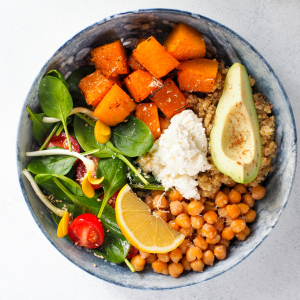Adopting a plant-based diet is one of the most powerful decisions you can make for your health. Whether you’re looking to prevent chronic diseases, lose weight, or simply feel better each day, the health benefits of a plant-powered lifestyle are backed by science and supported by nutrition experts around the world.
Unlike fad diets that focus on cutting carbs or calories, a plant-based diet emphasizes whole, minimally processed foods—fruits, vegetables, legumes, nuts, seeds, and whole grains—that are rich in fiber, antioxidants, and essential nutrients.
Table of Contents
What Is a Diet?
A diet is simply the way a person eats—the kinds of foods and drinks they regularly consume. It can refer to your overall eating habits or to a specific plan designed to achieve a certain goal, such as weight loss, muscle gain, or managing a health condition.
Different Types of Diets:
- Balanced Diet – Includes all food groups in proper portions
- Weight Loss Diet – Aims to reduce calorie intake (e.g., keto, low-carb)
- Medical Diet – Used to manage diseases (e.g., diabetic or low-sodium diets)
- Lifestyle Diet – Long-term choice like vegan, plant-based, or Mediterranean
Key Components of a Healthy Diet:
- Fruits & vegetables
- Whole grains
- Protein (plant or animal)
- Healthy fats
- Plenty of water
- Minimal junk or sugary foods

What Is a Plant-Based Diet?
A plant-based diet is a way of eating that focuses primarily on whole, natural foods that come from plants. This includes:
- Vegetables
- Fruits
- Whole grains (like brown rice, oats, quinoa)
- Legumes (beans, lentils, peas)
- Nuts and seeds
- Plant oils (like olive or avocado oil)
- Herbs and spices
The goal is to eat mostly or entirely plant foods, while minimizing or eliminating animal products such as meat, dairy, eggs, and processed foods.
Key Characteristics of a Plant-Based Diet:
- Emphasizes whole foods over processed items
- Rich in fiber, antioxidants, and healthy fats
- Low in saturated fat and cholesterol
- Free of added hormones and antibiotics
- May or may not be fully vegan or vegetarian
Some people follow a plant-based diet 100%, while others adopt it flexibly—like eating mostly plants during the week but occasionally including fish, eggs, or dairy.
Types of Plant-Based Diets:
| Diet Type | Includes Animal Products? | Description |
|---|---|---|
| Vegan | ❌ None | Only plant foods, no animal products at all |
| Vegetarian | ✅ Dairy, eggs | No meat or fish, but includes some animal byproducts |
| Flexitarian | ✅ Occasionally | Primarily plant-based, but allows occasional meat or fish |
| Whole Food Plant-Based (WFPB) | ❌ None | Focuses on unprocessed plant foods; excludes added oils, sugars, and refined grains |
Nutrients Found in Plant-Based Foods
1. Fiber – Improves digestion, lowers cholesterol, and controls blood sugar.
Sources: Oats, beans, lentils, chia seeds, broccoli, apples.
2. Plant-Based Protein – Builds and repairs muscles, supports immunity.
Sources: Lentils, chickpeas, tofu, tempeh, quinoa, edamame, hemp seeds.
3. Iron (Non-Heme) – Supports oxygen transport in blood.
Sources: Spinach, lentils, pumpkin seeds, quinoa, tofu. Pair with vitamin C to boost absorption.
4. Calcium – Strengthens bones and teeth, supports muscle function.
Sources: Kale, bok choy, fortified plant milks, almonds, sesame seeds.
5. Omega-3s (ALA) – Supports brain and heart health, reduces inflammation.
Sources: Flaxseeds, chia seeds, walnuts, hemp seeds, algae oil.
6. Vitamin B12 – Essential for nerve function and red blood cell formation.
Sources: Fortified plant milks, nutritional yeast, supplements.
7. Vitamin D – Helps calcium absorption, supports immunity, and mood.
Sources: Fortified plant milks, mushrooms (sun-exposed), supplements.
8. Magnesium – Supports muscles, nerves, and energy production.
Sources: Spinach, almonds, pumpkin seeds, black beans, bananas.
9. Zinc – Aids immune function, metabolism, and healing.
Sources: Chickpeas, cashews, hemp seeds, whole grains, tofu.
10. Potassium – Regulates blood pressure and muscle function.
Sources: Sweet potatoes, bananas, avocados, beans, oranges.
11. Antioxidants (Phytonutrients) – Protect cells, reduce inflammation, slow aging.
Sources: Berries, green tea, turmeric, kale, beets.
12. Folate (Vitamin B9) – Supports cell growth, vital during pregnancy.
Sources: Leafy greens, lentils, avocados, oranges, and asparagus.

Importance of Nutrients in a Plant-Based Diet
1. Support Vital Body Functions
Nutrients like vitamins, minerals, and proteins help your body perform essential tasks such as digestion, muscle movement, brain function, and energy production.
2. Prevent Deficiencies and Disease
Getting enough iron, calcium, B12, and omega-3s from plant-based sources or fortified foods helps prevent fatigue, weak bones, anemia, and cognitive decline.
3. Boost Immune Health
Nutrients like vitamin C, zinc, and antioxidants strengthen your immune system and protect against infections and chronic diseases.
4. Aid in Weight Management
Fiber, plant proteins, and healthy fats promote satiety, reduce cravings, and help maintain a healthy weight naturally.
5. Enhance Mental Clarity and Mood
Magnesium, omega-3s, and B vitamins support brain health, improve focus, and help reduce symptoms of anxiety and depression.
6. Improve Heart Health
A diet rich in potassium, fiber, and healthy fats lowers blood pressure, cholesterol, and the risk of heart disease.
7. Strengthen Bones and Muscles
Calcium, magnesium, vitamin D, and plant proteins are crucial for bone density and muscle repair, especially in active individuals and aging adults.
8. Promote Longevity and Aging Well
Antioxidants and anti-inflammatory compounds from whole plant foods slow cellular aging and reduce the risk of age-related diseases.
What Are the Three Main Reasons for Eating Plant-Based?
1. For Better Health
Plant-based diets are rich in fiber, vitamins, minerals, and antioxidants. They can lower the risk of heart disease, obesity, type 2 diabetes, and some cancers while improving energy, digestion, and overall longevity.
2. To Protect the Environment
Eating plants uses fewer natural resources and produces less pollution than animal farming. It helps reduce greenhouse gas emissions, water use, and deforestation, making it a sustainable choice for the planet.
3. Out of Compassion for Animals
Many choose plant-based diets to avoid contributing to animal suffering in factory farms. It’s a lifestyle based on ethics, non-violence, and respect for animal life.

10 Benefits of a Plant-Based Diet You Need to Know
Here are 10 incredible health benefits of a plant-based diet you need to know—and why switching to plants may be the healthiest choice you ever make.
1. Protects and Strengthens Heart Health
Cardiovascular disease is the world’s leading cause of death—but a plant-based diet can dramatically lower your risk.
Plants are naturally cholesterol-free and low in saturated fat. Unlike animal products, they support healthy blood vessels, reduce inflammation, and lower blood pressure. A growing body of research shows that people following a plant-based lifestyle have lower rates of heart attacks, strokes, and heart-related deaths.
Key Nutrients:
- Fiber: Helps reduce LDL (bad) cholesterol.
- Potassium: Regulates blood pressure (found in bananas, potatoes, spinach).
- Omega-3s: Found in flaxseeds, chia seeds, walnuts—support heart rhythm and reduce inflammation.
Study Highlight: A 2019 study in the Journal of the American Heart Association found that people who ate mostly plant-based foods had a 16% lower risk of cardiovascular disease and 32% lower risk of death from heart disease.
2. Aids in Healthy, Sustainable Weight Loss
Switching to a plant-based diet is one of the most effective (and natural) ways to lose excess weight—without calorie counting or restrictive rules.
Plant foods are lower in calories and higher in volume and fiber, keeping you full longer. They stabilize blood sugar levels and curb overeating by eliminating processed, high-fat animal products that contribute to weight gain.
Why It Works:
- Low energy density: You can eat more and feel satisfied with fewer calories.
- Improved metabolism: Fiber and complex carbs support steady energy release.
- Reduced cravings: Balanced meals decrease the urge for junk food.
Real Result: A review in The Permanente Journal found that people following plant-based diets lost more weight than those on other diets—and kept it off longer.
3. Supports Healthy Blood Sugar and Prevents Type 2 Diabetes
A plant-based diet can lower your risk of developing type 2 diabetes—or help manage it more effectively.
High-fiber foods such as beans, lentils, oats, and vegetables slow the absorption of sugar into the bloodstream. Unlike high-fat diets, which can contribute to insulin resistance, plant-based meals improve your body’s ability to use insulin properly.
Benefits for Diabetics:
- Stabilized blood sugar levels.
- Improved insulin sensitivity.
- Lower HbA1c readings (a key marker for diabetes management).
Study Highlight: According to the American Diabetes Association, plant-based diets are associated with improved glycemic control and reduced risk of developing diabetes.
4. Improves Digestive Health and Regularity
The digestive system thrives on fiber, and plant-based diets provide it in abundance.
Animal-based foods contain zero dietary fiber, whereas whole plant foods are packed with both soluble and insoluble fiber. This keeps your digestive system running smoothly, supports regular bowel movements, and fosters a healthy gut microbiome.
Digestive Perks:
- Prebiotics: Feed good gut bacteria.
- Improved nutrient absorption.
- Relief from bloating and constipation.
Pro Tip: Aim for 30+ grams of fiber daily through whole grains, vegetables, fruits, and legumes.
5. Lowers Inflammation Throughout the Body
Chronic inflammation is linked to nearly every major disease—including heart disease, diabetes, cancer, and autoimmune conditions.
A plant-based diet provides natural anti-inflammatory compounds that calm your body’s immune response. Fruits, vegetables, seeds, and spices contain antioxidants that reduce oxidative stress and promote healing at the cellular level.
Anti-Inflammatory All-Stars:
- Berries, turmeric, ginger, dark leafy greens, and extra virgin olive oil.
Scientific Insight: The polyphenols and flavonoids in plant foods reduce levels of C-reactive protein (CRP), a key inflammation marker in the blood.
6. Reduces the Risk of Certain Cancers
A diet rich in plant-based foods has been shown to lower the risk of several cancers, including colorectal, breast, prostate, and stomach cancers.
Plants are loaded with phytochemicals, antioxidants, and fiber that protect against DNA damage, neutralize carcinogens, and promote the elimination of toxins.
Cancer-Fighting Properties:
- Cruciferous vegetables (like broccoli, cauliflower) contain sulforaphane.
- Tomatoes provide lycopene, known to protect against prostate cancer.
- Whole grains and legumes feed healthy bacteria that reduce colon cancer risk.
Important Study: The World Cancer Research Fund recommends plant-based diets as part of a cancer prevention strategy.
7. Promotes Better Brain Health and Cognitive Function
Your brain is a high-energy organ—and it depends on quality nutrients to function optimally.
A plant-based diet provides antioxidants, healthy fats, and anti-inflammatory nutrients that protect the brain from aging, oxidative damage, and cognitive decline. Emerging research also links plant-based eating to reduced risk of Alzheimer’s and dementia.
Brain-Boosting Nutrients:
- Omega-3s from walnuts, chia, and flax.
- Polyphenols from berries and green tea.
- Vitamin E from nuts and seeds (protects nerve function).
Bonus: A fiber-rich gut promotes healthy neurotransmitter production, improving mood and mental clarity.
8. Supports Healthy Skin and Slows Aging
Your skin is your body’s largest organ—and it reflects your inner health.
A plant-based diet delivers a wide range of vitamins (A, C, E, K), antioxidants, and hydration, which protect skin cells, boost collagen production, and fight signs of aging like wrinkles and dullness.
Skin-Enhancing Benefits:
- Clearer skin from lower inflammation and fewer hormones (especially from dairy).
- Improved skin tone from hydration and antioxidant intake.
- Natural glow from vitamins and minerals in fresh produce.
Quick Fix: Add avocado, sunflower seeds, and berries to your daily meals for visible results in just weeks.
9. Strengthens Immunity and Fights Infections
A strong immune system starts in your gut and depends on the nutrients you consume every day.
A plant-based diet fuels your immune cells with vitamins, minerals, and compounds that enhance your body’s ability to fight bacteria, viruses, and other threats.
Immune-Boosting Powerhouses:
- Vitamin C from citrus fruits and bell peppers.
- Zinc from chickpeas, pumpkin seeds, and whole grains.
- Beta-carotene from carrots, sweet potatoes, and leafy greens.
What Happens: Plants regulate inflammation, stimulate antibody production, and speed up recovery time when you get sick.
10. Enhances Longevity and Overall Vitality
Want to live longer and healthier? A plant-based diet might be your ticket to a longer life.
Studies of “Blue Zones” (regions where people live the longest) show that diets rich in whole plant foods are linked to longer lifespan, fewer age-related diseases, and improved physical function in later years.
Longevity Factors:
- Lower oxidative stress and DNA damage.
- Balanced hormone levels from avoiding animal hormones.
- Reduced cellular aging through plant antioxidants.
Research Insight: The Adventist Health Study found that vegetarians live an average of 7 years longer than meat-eaters, with lower incidence of all major chronic illnesses.
Is a 100% Plant-Based Diet Healthy?
Yes — a 100% plant-based diet can be very healthy when it’s well-planned. It provides most of the essential nutrients your body needs through whole foods like fruits, vegetables, legumes, whole grains, nuts, and seeds.
✅ Health Benefits:
- Lowers risk of heart disease, type 2 diabetes, high blood pressure, and certain cancers
- Supports healthy digestion, weight management, and energy levels
- High in fiber, antioxidants, and anti-inflammatory compounds
⚠️ Important Considerations:
To stay healthy on a fully plant-based diet, you need to ensure you’re getting these key nutrients:
- Vitamin B12 (via supplements or fortified foods)
- Vitamin D (sunlight, fortified foods, or supplements)
- Omega-3 fatty acids (from flax, chia, hemp, walnuts, or algae oil)
- Iron, calcium, zinc, iodine (from diverse plant sources or fortified options)
Conclusion
Switching to a plant-based diet is one of the most powerful steps you can take for your health. From reducing the risk of chronic diseases to improving digestion, boosting energy, and supporting a healthy weight, the benefits are backed by both science and real-life success stories. A well-balanced plant-based lifestyle provides your body with the essential nutrients it needs to thrive—naturally and sustainably.
Whether you’re going 100% plant-based or just adding more plant meals to your week, every step counts. Prioritize whole foods, stay consistent, and listen to your body. Your future self will thank you.
Plant-Based Diet FAQ
1. What do you eat on a plant-based diet?
Fruits, vegetables, whole grains, legumes, nuts, seeds, and plant-based oils. Animal products and processed foods are limited or avoided.
2. What is included in a plant-based diet?
Whole plant foods like leafy greens, berries, beans, lentils, tofu, quinoa, oats, almonds, chia seeds, and olive oil.
3. Is a plant-based diet healthy?
Yes. It can reduce the risk of heart disease, diabetes, and certain cancers, and support weight control, digestion, and long-term health.
4. What is a plant-based diet called?
It may be called a plant-based, vegan, or whole-food plant-based (WFPB) diet, depending on whether processed foods or animal products are excluded.
5. Is rice plant-based?
Yes. Rice (brown, white, wild, etc.) is a plant-based whole grain and is commonly included in plant-based meals.
6. How to start a plant-based diet?
Start by adding more vegetables, fruits, and whole grains to your meals. Gradually reduce meat, dairy, and processed foods. Meal prep and plan ahead.
7. What is the best plant-based food?
Nutrient-rich options like leafy greens, berries, beans, lentils, chia seeds, quinoa, tofu, and sweet potatoes are among the best.
8. Can I lose weight by eating plant-based?
Yes. Many people lose weight naturally on a plant-based diet due to higher fiber intake, lower calories, and reduced processed food consumption.





